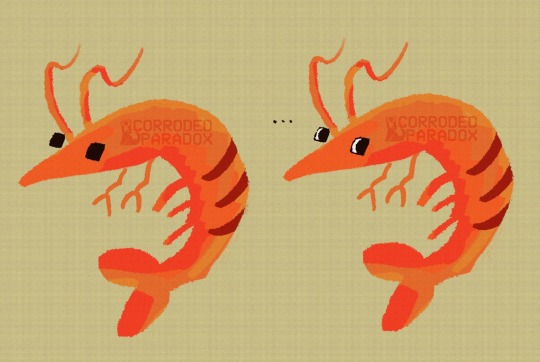Don't wanna be here? Send us removal request.
Text

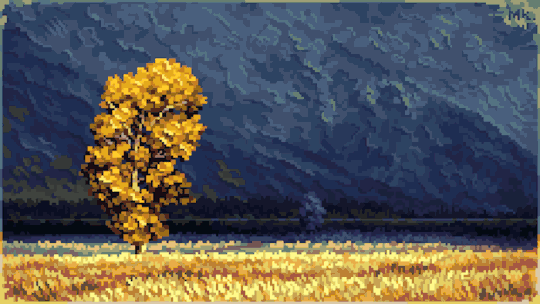
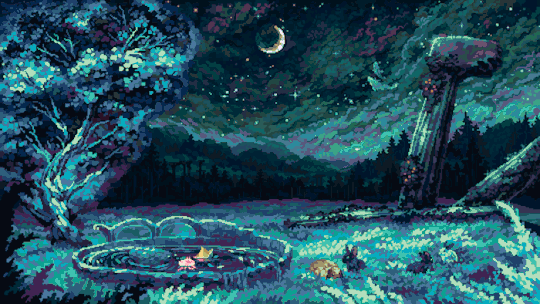
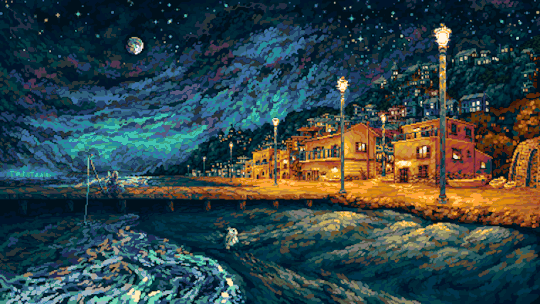
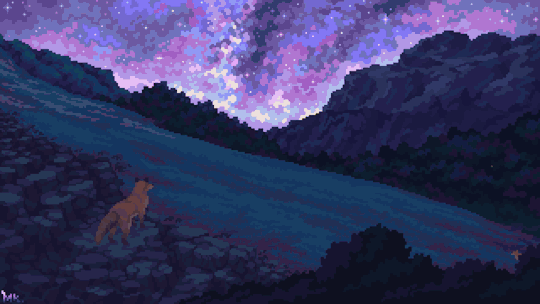
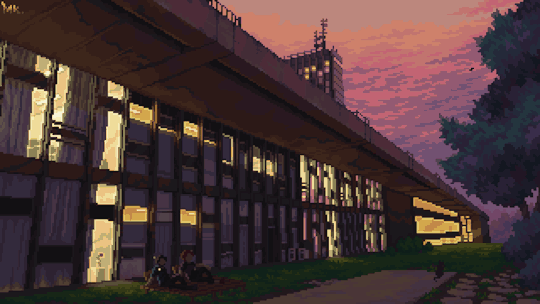
Moments in time, preserved through sentiments Twitter | Ko-Fi | Patreon
234K notes
·
View notes
Text

it's the end of the year and you're walking through fresh snow under the Northern Lights ❄
get the high-res mobile wallpaper in my Winter Pack here
17K notes
·
View notes
Text

"Send me back, Mother Universe."
On January 2nd 2025, we lost our bunny Mimi after having her for 11 years and 11 months. If she had reached January 7th, she would have been 12 years old. We part blessed and without any "we should have's" or "if only's". We truly were blessed with her love and gave her all of our own.
7K notes
·
View notes
Text
🎀 LOVE YOU!
link


♡ ᵔ ᵔ) how to use: go to file = make a copy
♡ ᵔ ᵔ) actors: psd and pngs not included sorry :(
♡ ᵔ ᵔ) mobile friendly. feel free to change any and everything, but please do not remove the credits. please turn on copylock!
♡ ᵔ ᵔ) DO NOT distribute without permission.
♡ ᵔ ᵔ) photos: veil by kotteri
194 notes
·
View notes
Text





007. — SPARKLES & PIZZAZ!
In this fully colour-customisable template, the spotlight truly shines on your character. With space for up to 13 pictures and well-placed quotes, this is the perfect template for any glamorous or confident characters— or even flirty, with darker colours.
&& —
Instructions on using and customising the document are provided with the purchase.
Please do not remove my credit.
The face claim used in the document is Daniel Kaluuya.
Likes and reblogs are appreciated :)
— DOWNLOAD
61 notes
·
View notes
Text





ALL-IN-ONE WRITING TRACKER: “VAMPIRE VISIT”
a highly customizable, automated but simple googlesheets for writers - especially for those participating in monthly writing challenges (e.g., NaNoWriMo). perfect for tracking your progress with minimal effort and keeping it aesthetically-pleasing with a gothic touch. to download / copy, go to file and click “make copy” to copy it to your gdrive.
features:
set up page for the writing goals you want to achieve
automated writing stats based on your progress
automated graph for tracking your word count
task management board for your todos
detailed writing session and word count tracker for every day with automated perks
an automated achievements page based on your goals
a fun bingo page
please like / reblog if you’re using or interested in using it!
+ novel preparation doc for gDocs here. + former writing tracker (ver. 2022) for gSheets here.
413 notes
·
View notes
Text




◦˚~ ARTICLE by enchanthings ~˚◦ [PREMIUM]
Info:
Another minimalistic google docs template
Page size: A4 (8.27" x 11.69")
Font: Verdana, Puritan
Number of pages: 6
Features: Navigation on the first page, Title page
Drawings: No
Terms of Use:
You may edit all editable parts as you wish (colors, images, elements, add, replace, or remove, etc).
You may mix pages only with pages from my other templates.
Do not remove my credit from the templates.
Do not copy, sell, redistribute my templates in any way.
My ask box is open if you have any questions/problems!
◦˚~ [ download access through source link ] ~˚◦
164 notes
·
View notes
Text


009: "oh, my angel !"
introducing. . . , "oh, my angel!" , a google doc character template inspired by the collectible toy: sonny angels! The doc holds two portrait pages. It includes spots for the profile, persona, fears, habits, likes, dislikes, character traits, connections and backstory.
( !!! ) make sure to credit me! in order to do that, keep my @ at the top of the first page!
HOW TO USE ! ◞ . . . this is not a mobile-friendly doc, as it holds drawings. To change what the drawings say, click on it and press 'edit'. ◞ . . . If you want to make more room for text, you can make the text a little smaller and still be able to read it. ◞ . . . the doc doesn't have any pictures to replace, so please keep that in mind! ◞ . . . If you have any questions, please ask! ◞ . . . I know it's been a long time, but I'll release more docs soon! I have three others about to go through the testing stages, along with many other ideas for docs! As mentioned, some will be paid, but the same amount will be free! If you have any suggestions, feel free to share. ◞ . . . additionally, I have a fc library document in the making. look forward to it! ◞ . . . download here
437 notes
·
View notes
Text








— introducing 016: JUNIPER + [ link ]
a semi-mobile friendly google doc template inspired by spring. this doc is clean and light but with a hint of edge, perfect for those who prefer more minimalist templates that are easy to edit (and with no google drawings). this premium template and a full page-by-page preview can be found in the link above or in the source link.
features:
8 unique 14" x 8.5" pages with ample space for long writing, and also free sections for smaller amounts of writing
most pages, including the connections page, that can be easily duplicated for more
terms of use:
you may edit to your heart’s desire. Change the colours, replace, add or remove elements and images etc.
you may remix pages with pages from my other templates.
you may not remove the credit from the templates.
you may not copy, sell or redistribute my templates whether wholesale, in part (i.e. taking out certain pages) or remixed (i.e. modified).
you will also receive an additional guide with images on how to use and edit google doc templates! if you have any problems or issues, feel free to leave an ask or join our discord server.
thank you for your likes & reblogs!! ♡
523 notes
·
View notes
Text
PERSONAL PROFILE: GOD’S PROPHET !
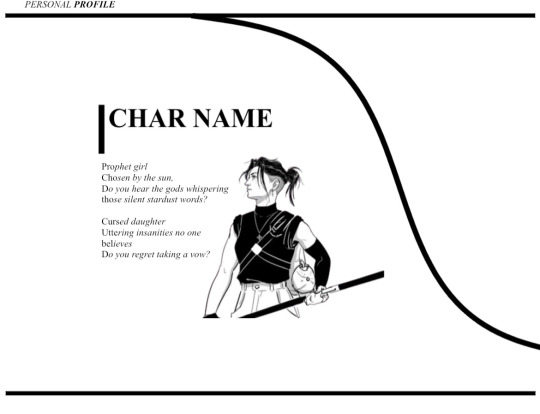
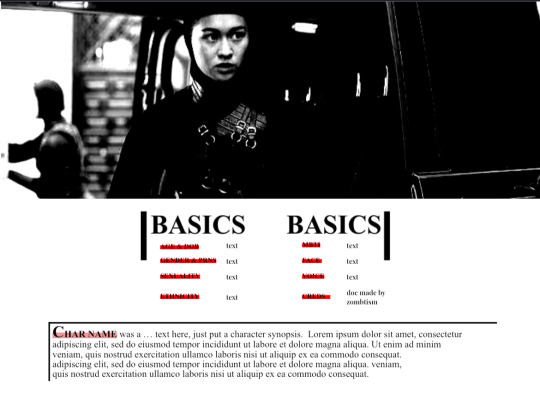

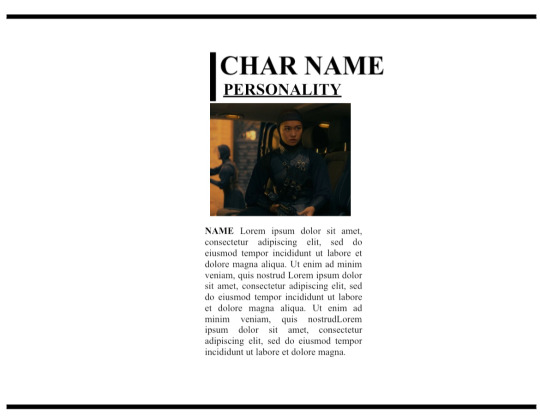
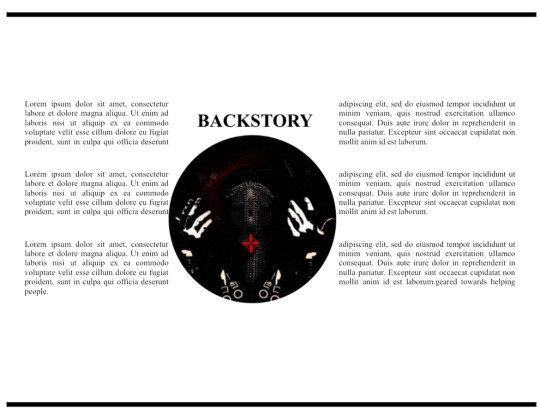
a free, pc only, 6 page single muse doc design. This template is not mobile friendly, it is only for pc / computer users.
please contact @ zombtism on discord for any questions or concerns.
35 notes
·
View notes
Text
┄ skyward sonnett

skyward sonnet is a free doc themed on columbina from genshin impact, best viewed on print layout for easier access with editing.
you can ⦂
ꔫ change template colors
﹒ change the photos
ꔫ basically anything else
you may not ⦂
﹒ Remove the credit for any reason at all (you may move it to a different area within the doc)



⠀⠀⠀ ⠀⠀⠀ 𓏵 warning ⠀ ⸺⠀⠀not very mobile friendly!
⠀
170 notes
·
View notes
Text
iii — publicity




back at it again!! download it HERE
publicity is a 4-page, single-muse, mobile-friendly doc inspired by online blogs and social media! it's made up entirely of tables, so navigating it should be fairly easy! please be mindful of how much you write, as adding too much or too little can mess up the formatting!
features :
4, 8.5" x 13" pages
character synopsis, appearance, personality, backstory, rp sample
connections, headcanons and verse sections
how to use :
after purchasing, you will receive a link to the template! just click on it, select "file" and then "make a copy"
be sure to change the settings so nobody can make copies of your doc! click on "share", then the settings wheel, and turn off "viewers and commenters can see the option to download, print, and copy"
terms of use :
feel free to edit however you want!
do not remove the credit.
do not copy, sell or redistribute my templates.
if you like this temp, feel free to reblog and boost my work, mayhaps ? <33
45 notes
·
View notes
Text
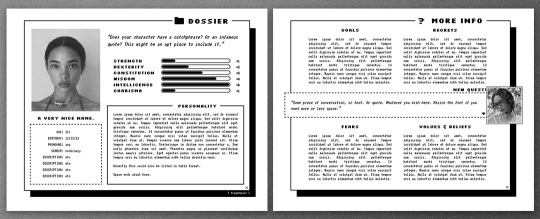



— introducing 003: PLAYER ONE + [ link ]
a semi-mobile friendly google doc template inspired by retro nintendo gameboys and 1 bit platformer games. this template is super versatile and perfect not just for gamer muses, but also sci-fi rps or tabletop games like d&d. it can also double up as an rp information document, or even an app form for rps, as the template has been made to be flexible for the inclusion of extremely long writing! this premium template and a page-by-page preview can be found in the link above or in the source link.
features:
10 unique 11" x 8.5" pages with plenty of space for writing; some quotes, multiple short sections and special long text and connection sections that make them flexible to fit your needs
duplication of specific pages that will allow many connections or writing as long as you require in the document while maintaining aesthetic cohesion!
pages that can all be easily duplicated, deleted and rearranged to your liking, with some google doc knowledge
all elements that are fully customizable within google docs & google drawings — including stats and health bar
terms of use:
you may edit to your heart’s desire. Change the colours, replace, add or remove elements and images etc.
you may remix pages with pages from my other templates.
you may not remove the credit from the templates.
you may not copy, sell or redistribute my templates whether wholesale, in part (i.e. taking out certain pages) or remixed (i.e. modified).
you will also receive an additional guide with images on how to use and edit google doc templates! if you have any problems or issues, feel free to leave an ask or join our discord server.
this is definitely my favourite template so far, and I'm so excited to be sharing this with all of you. it's just so versatile, practical and easy to edit. I hope you enjoy this template as much as I do, and as always, likes + reblogs are always appreciated. ♡
448 notes
·
View notes
Text

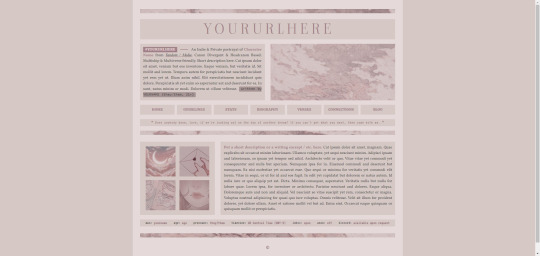
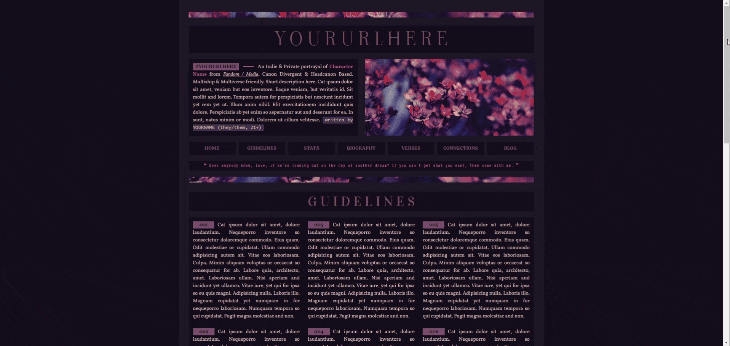
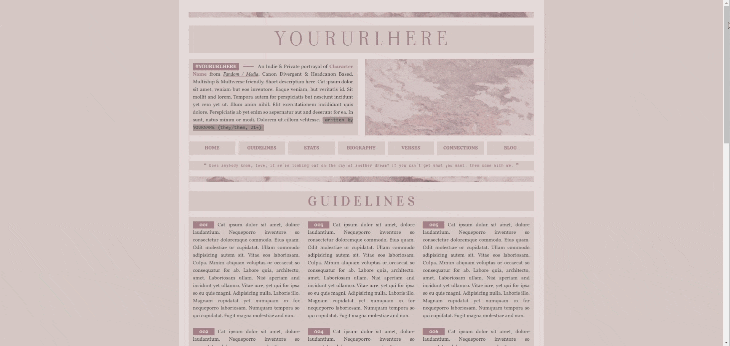
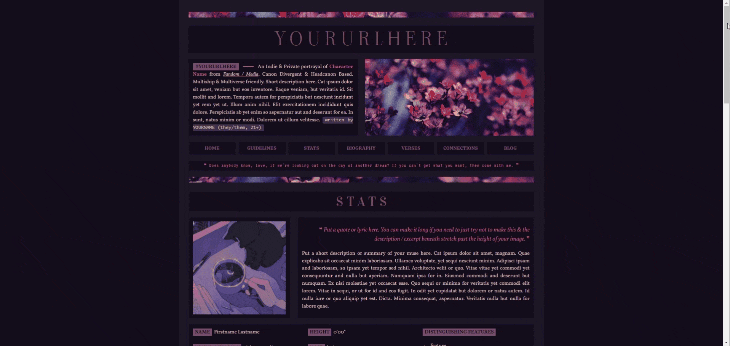
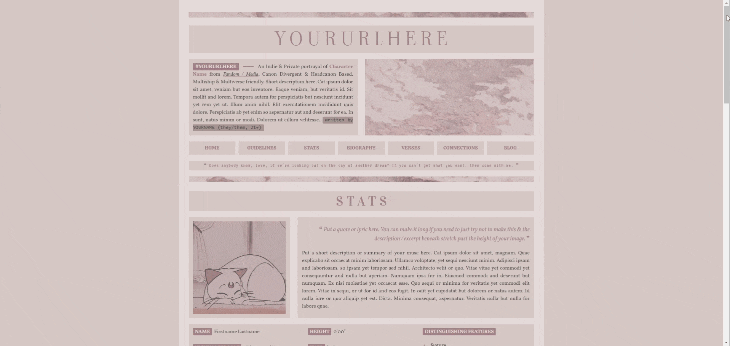




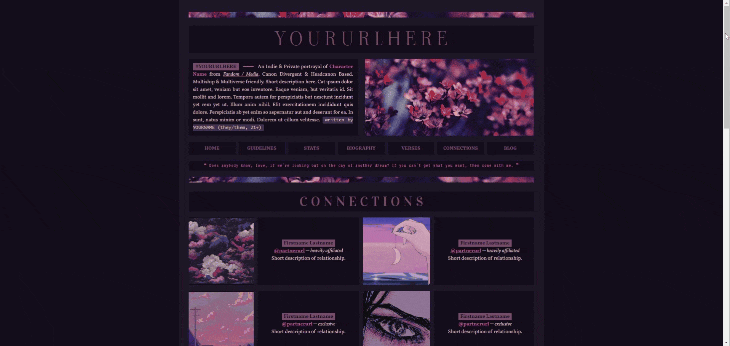

𝐃𝐑𝐄𝐀𝐌𝐄𝐑* & 𝐆𝐇𝐎𝐒𝐓𝐋𝐘*
Twin single muse carrd templates based on the recent palette poll.
✧ Features: A more in-depth carrd design prioritizing information, so you'll have plenty of room to write all the important stuff about your muse. Comes in a light version and a dark version based on the winner(s) of the latest palette poll I did. Highly customizable but may require more patience when editing due to the amount of unique elements. Tested to be mobile friendly but that may vary by device. Contains a customizable sticky header, a page for guidelines, a stat page, a biography page, a page for verses, and a page for connections & npcs. There are small quad-style image galleries in different sections, and there should be plenty of room for you to resize images to fix the block style of presentation when your text runs over. If you have any issues or questions about editing the carrds, you are more than welcome to ask me here on my tumblr and I will try my best to help you!
✧ Terms of Use: Like / Reblog if you use, please. Do NOT use this for illegal content or to promote hate (this includes "burn books" and callout / vent blogs). Do NOT remove the credits or make them invisible somehow. Edit as you wish, but no matter how much you change it, do NOT claim it as your own!
✧ Price: $5 for early access , both are now FREE / pay what you want as of October 14th. If you want to help a girl out with a tip, I'd greatly appreciate it 💗 ( Important Note! This template requires Pro Lite or higher to use due to the number of features included ! )
DARK ─【 DREAMER DEMO ✧ DREAMER DOWNLOAD 】 LIGHT ─【 GHOSTLY DEMO ✧ GHOSTLY DOWNLOAD 】
479 notes
·
View notes



